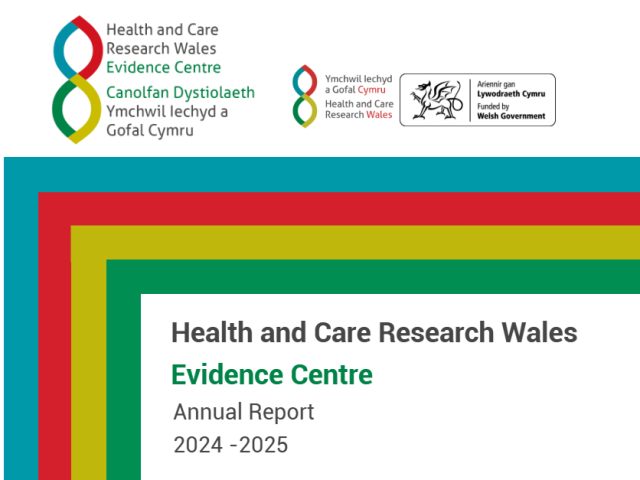
Annual Report 2024 - 2025
16 September
Annual Report 2024 - 2025
We are delighted to share our second Annual Report of the Health and Care Research Wales Evidence Centre.
Evidence Centre Annual Report 2024-2025
The work covers a real breadth of important topics to help inform the delivery of quality services for the people of Wales, ranging from crucial public health challenges like childhood obesity, enhancing the safety of ‘special procedures’ like tattooing and acupuncture, and the impact of medical tourism on NHS Wales.
The work of the Evidence Centre over the past year also involving the public in the reform of services like dental care, understanding the value of palliative care services, mitigating suicide risks at locations of concern, the validity of surgical risk prediction tools to tackle waiting lists, and also reablement services to reduce hospital admission and long term care needs.
Each of our studies address critical challenges for health and social care provision in Wales and the evidence is being used by Welsh Government politicians and policy-makers, and NHS and social care Directors to improve quality, safety, efficiency and experience of services for the people of Wales.
During our most recent call for questions (Spring 2025), we received 59 submissions and our updated Work Programme for Summer 2025 – 2026 is now available to view online. Final reports and related outputs (including plain English summaries and infographics) are available for every completed study to date via our online Report Library.
Highlights include:
- Health Technology Wales Complications and costs to the NHS due to outward medical tourism for elective surgery: a rapid review - The findings from this study will help inform the Welsh Government’s understanding of the scale and impact of medical tourism on patients and the NHS in Wales, and help to inform national guidance and policy decisions on the matter.
- Wales Centre for Evidence Based Care / Specialist Unit for Review Evidence, Cardiff University A rapid review of the effectiveness of interventions to enhance equitable or overall access to mental health services by ethnic minority groups - The findings have informed the Equality Impact Assessments for two new Welsh Government strategies, the Mental Health and Wellbeing Strategy for Wales, and the Suicide Prevention and Self-Harm Strategy for Wales.
- Public Health Wales A rapid review of the effectiveness of smoking cessation interventions for people with anxiety and/or depression living within the community - The findings will inform the updated Tobacco Control Delivery Plan for Wales and are set to be presented to the Tobacco Control Strategic Board later this year
- Bangor Institute for Health and Medical Research / Centre for Health Economics and Medicines Evaluation The clinical and cost-effectiveness of interventions for preventing continence issues resulting from birth trauma: a rapid review - The findings have helped to inform Priority Area 5 of the recent NHS Wales Women’s Health Plan 2025 – 2035 relating to pelvic health and incontinence.
- In-house Primary Research De-medicalising gluten-free products through a subsidy card scheme: a qualitative study of service users – these study findings have been instrumental in the introduction of the upcoming all-Wales gluten free card subsidy scheme.
- Population Data Science, Swansea University Health and Care Pathways in the Last Year of Life from Non-Sudden Causes between 2014 and 2023 in Wales: A Population-Scale Retrospective Cohort Study - The findings of this study will be used by the National Programme for End of Life and Palliative Care in Wales, which is tasked with informing Welsh Government policy over the next 25 years for palliative and end of life care in Wales.
The Evidence Centre’s Public Partnership Group (PPG) of 10 members has continued to play a vital role in the Centre’s second year of work. They have been involved in all our research, including helping to refine the research questions, understanding the relevance of the findings, and writing lay summaries to accompany all our final reports.
We are very grateful to our funder, the Welsh Government (funded via Health and Care Research Wales).